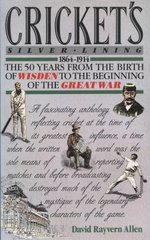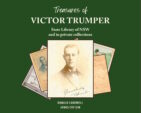Cricket’s Silver Lining
Archie Mac |Published: 1987
Pages: 436
Author: Allen, David Rayvern (Editor)
Publisher: Collins Willow
Rating: 4 stars

Anthologies are always a hit and miss affair, fortunately Cricket’s Silver Lining is a hit. The reasons undoubtedly are the choices of each piece by the editor David Rayvern Allen, who seems to have trawled through every forgotten magazine for the period covered which, the dusk jacket tells us is the 50 years from the birth of Wisden to the beginning of the Great War. That said not quite all the entries are from the period, with one written as late as 1978.
This period features W.G. Grace at his peak and the golden age of cricket, when the game was the most popular sport both in England and Australia. WG is not remembered as a deep thinker about his sport, his ghosted biographies confirm this. However, the Doctor correctly predicts, in an interview in the book which was first published in 1895, the end of amateurs with all participants playing for money.
The interviewer one Fred W. Ward, features in the book on three occasions, interviewing, apart from Grace, Archie MacLaren and Prince Ranji. It is interesting how many details the players seem to have about their careers, peppering their respective interviews with exact scores and averages. With no tape recorders and extremely long quotes it would be fascinating to know how these interview were conducted, but then perhaps a bit of mystery is not a bad thing.
The book is not just interviews, it features some of the best known writers of the time, such as Alec Waugh (the less famous brother of Evelyn Waugh), Colonel Phillip Trevor, Conan Doyle, P.G. Wodehouse, Neville Cardus and even the Surrey poet; Albert Craig. What is interesting is that not a lot has changed; writers still pick the best batsman and bowlers of the time, complain about crowd behaviour and write about the need for entertaining cricket.
One of the most interesting entries is by Gerald Pawle, cricket and rugby writer for the Yorkshire Post. He explains the life of a cricket correspondent and the pressure to have their pieces phoned in immediately at the end of each days play to enable their publishing in the evening papers.
Out of the countless cricketing anthologies published this is as good as any, perhaps because of the period covered but most likely because the quality of the writing chosen by the editor. Highly recommended.






Leave a comment